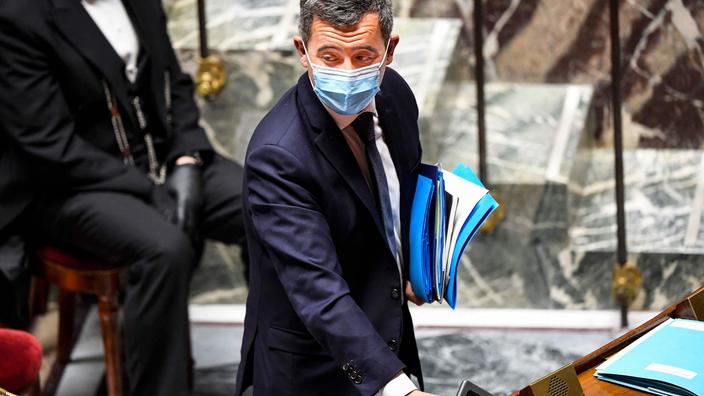The Interior Ministry has been working on it “
for months
” and swears that it is “
not an answer
” to the Rambouillet attack.
A new bill on intelligence and the fight against terrorism, which updates measures already tested in this area, arrives Wednesday April 28 in the Council of Ministers.
Read also: Financing of terrorism: the discreet work of the intelligence services is bearing fruit
This text carried by the Minister of the Interior is, for the most part, only the grooming of an arsenal of already existing provisions but that the executive wanted to engrave in legislative marble.
With 19 articles, it aims mainly to "
update
", or even strengthen, several provisions of the intelligence law of July 2015 and the law on internal security and the fight against terrorism (Silt) of October 2017, he explains. -on at the Ministry of the Interior.
Reinforcement of
"
home visits
"
The "
home visits
" formerly called "
administrative searches
", which Gérald Darmanin had intensified after the assassination of Samuel Paty in October 2020, may be accompanied by the seizure of computer equipment if a suspect refuses to give access to its content .
Originally, Gérald Darmanin wanted the justification for these “
home visits
” to no longer be a “
particularly serious
threat
”, but a “
serious threat
”, in order to facilitate the use of these searches.
The minister finally gave up after the advice of the Council of State.
Closer supervision when leaving prison
Individual control measures (Micas), formerly called "
house arrest
", may be extended "
up to two years
" after release from prison, against one year today, for people sentenced to at least five years. for terrorism.
This measure is particularly sensitive given that 500 people are currently serving sentences related to terrorism, that a hundred were released from prison in 2020 and that around sixty are due out in 2021.
To read also: Terrorism: worries around “dry releases” from prison
These same "
leavers
", if they present a "
particularly high risk
" of recidivism, may also be the subject of legal measures, such as establishing a residence in a given place or respecting health care, until five years after serving their sentence.
This provision comes in response to the censorship in August 2020 by the Constitutional Council of a proposed LREM law aimed at establishing “
security measures
” for these terrorist detainees at the end of their sentence.
Algorithms to track radicalization on the Internet
On the intelligence side, the text perpetuates the controversial technique of the algorithm, which allows the automated processing of connection data to detect threats, while extending it to web addresses (“URLs”).
The time allowed to collect computer data will be increased to two months, compared to just one today.
Beyond that, the data is considered "
dead
" but may be kept for five years for the purposes of research and development and to advance the artificial intelligence of the "
black boxes
" of the intelligence services.
Laurent Nuñez, former boss of the Directorate General of Internal Security (DGSI), stressed on Saturday "
the importance of this technique with increasingly isolated individuals whose only traces are digital traces
", like the author of the Rambouillet terrorist attack.
Asked in the
JDD
on the risk of infringement of individual freedoms, Gérald Darmanin asked to stop with "
naivety
".
“
All big companies use algorithms.
And would it only be the State that could not use them?
"
Easier access to personal data
The text expands the possibility of obtaining the assistance of electronic communications operators and extends the authorization period for the computer data collection technique to two months.
It also authorizes the retention of information for research purposes and facilitates the interception of correspondence exchanged by satellite.
"
The government plans to complete these provisions in the next few days
", explains the Ministry of the Interior, to bring them into line with the decision of the Council of State of April 21 which considered "
illegal the retention of data for other needs. than those of national security
”, excluding everyday delinquency.
Administrative closure of places of worship and their outbuildings
In addition to the administrative closure of places of worship suspected of being linked to acts of a terrorist nature, such as the Pantin mosque after the beheading of Samuel Paty, the bill offers the possibility of closing premises dependent on these places of worship.
This measure aims to "
prevent these places from being used by associations managing the place of worship in order
to
prevent its closure
", one explains to the Ministry of the Interior.
A security perimeter for people under surveillance
The bill provides for prohibiting a person under administrative supervision and required to reside in a determined geographical perimeter from appearing within this perimeter in a place "
in which an event is held subject, by its size or nature, to a particular terrorist risk
, ”says Place Beauvau.

